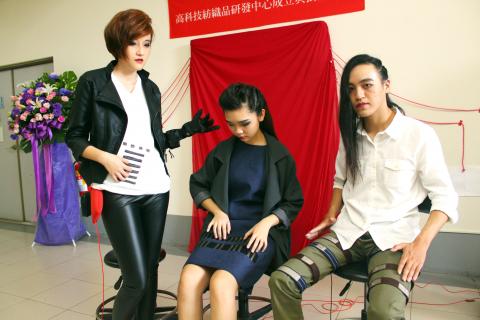Imagine going to a concert where the band members need nothing but their clothing to create the same dazzling spectacle they provided when they still carried their instruments. That dream might be coming true this year after Shu-Te University employed X-Static fiber, which emits sounds that are comparable to actual musical instruments via the transmission of digital signals, in its clothing designs.
Department of computer science and informational technology assistant professor Huang Yung-jen (黃永仁) said that a research team at the department has utilized silver in X-Static fiber to transmit signals, adding that precautions have been taken so that the wearer will not get an electric shock.
The team also ensured that the hidden sensors in the cloth are removable so that the clothes could be washed, thus enabling repeated use, Huang said.

Photo: Chen You-cheng, Taipei Times
The research group is in the process of tweaking the design, such as changing the reception device from an audio output device to portable stereo devices, Huang said.
In practice, the clothing would be able to emit sounds when it is touched by transmitting the signals to a portable device on the wearer’s belt, the university said.
Student Tsou Sheng-chuang (鄒勝壯) said he has been playing the drums for many years and using the clothing was not hard to learn.
The sound quality is comparable to that of actual instruments, which could remove the necessity of carrying around heavy instruments such as drums, Tsou said.
However, guitarist Hung Yi-shan (洪誼珊) said it was difficult for her to grasp how to play music with the clothing and she had to try it for three days before getting the hang of it.
“It’s just different without the actual instrument in my hands, but it’s a great feeling to be able to play music wherever I want to,” Hung said.
The university said it hopes its products will help to integrate entertainment and fashion with the concept of healthy living.

DEFENSE: The National Security Bureau promised to expand communication and intelligence cooperation with global partners and enhance its strategic analytical skills China has not only increased military exercises and “gray zone” tactics against Taiwan this year, but also continues to recruit military personnel for espionage, the National Security Bureau (NSB) said yesterday in a report to the Legislative Yuan. The bureau submitted the report ahead of NSB Director-General Tsai Ming-yen’s (蔡明彥) appearance before the Foreign and National Defense Committee today. Last year, the Chinese People’s Liberation Army (PLA) conducted “Joint Sword-2024A and B” military exercises targeting Taiwan and carried out 40 combat readiness patrols, the bureau said. In addition, Chinese military aircraft entered Taiwan’s airspace 3,070 times last year, up about

Taiwan is stepping up plans to create self-sufficient supply chains for combat drones and increase foreign orders from the US to counter China’s numerical superiority, a defense official said on Saturday. Commenting on condition of anonymity, the official said the nation’s armed forces are in agreement with US Admiral Samuel Paparo’s assessment that Taiwan’s military must be prepared to turn the nation’s waters into a “hellscape” for the Chinese People’s Liberation Army (PLA). Paparo, the commander of the US Indo-Pacific Command, reiterated the concept during a Congressional hearing in Washington on Wednesday. He first coined the term in a security conference last

A magnitude 4.3 earthquake struck eastern Taiwan's Hualien County at 8:31am today, according to the Central Weather Administration (CWA). The epicenter of the temblor was located in Hualien County, about 70.3 kilometers south southwest of Hualien County Hall, at a depth of 23.2km, according to the administration. There were no immediate reports of damage resulting from the quake. The earthquake's intensity, which gauges the actual effect of a temblor, was highest in Taitung County, where it measured 3 on Taiwan's 7-tier intensity scale. The quake also measured an intensity of 2 in Hualien and Nantou counties, the CWA said.

The Overseas Community Affairs Council (OCAC) yesterday announced a fundraising campaign to support survivors of the magnitude 7.7 earthquake that struck Myanmar on March 28, with two prayer events scheduled in Taipei and Taichung later this week. “While initial rescue operations have concluded [in Myanmar], many survivors are now facing increasingly difficult living conditions,” OCAC Minister Hsu Chia-ching (徐佳青) told a news conference in Taipei. The fundraising campaign, which runs through May 31, is focused on supporting the reconstruction of damaged overseas compatriot schools, assisting students from Myanmar in Taiwan, and providing essential items, such as drinking water, food and medical supplies,